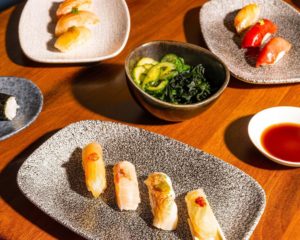
The Best Sushi in Wynwood
From sleek and modern interiors to the freshest ocean offerings meticulously crafted by skilled sushi chefs, each Wynwood sushi bar invites you to embark on a journey of flavor and elegance. Wynwood’s sushi scene is a fusion of tradition and innovation, promising an unforgettable dining experience that caters to both the purist and the adventurous palate. Read on to find your ideal nigiri bite or omakase experience: Haiku Haiku is a members-only private restaurant in Wynwood, Miami, offering an exclusive dining experience. The restaurant accommodates only one reservation per evening, serving a single member and up to 15 of their





